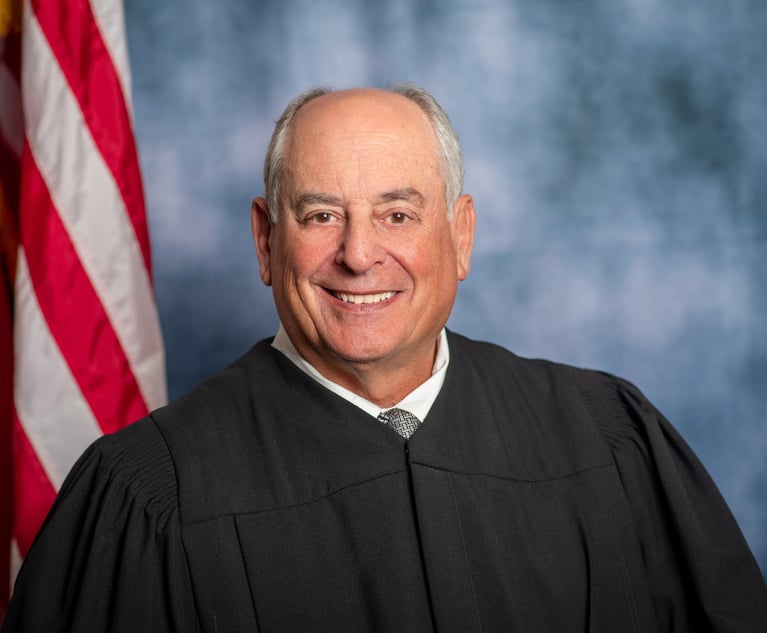 Greg Willis, Willis Law Firm, Atlanta (Courtesy photo)
Greg Willis, Willis Law Firm, Atlanta (Courtesy photo)Lawyer Who Won Supreme Court DUI Case: 'Straight Black-Letter Law'
Gregory Willis said the ruling that overturned a lower court was just a matter of asking the justices to leave 100 years of constitutional law intact.
February 19, 2019 at 05:24 PM
6 minute read
The Georgia Supreme Court's unanimous opinion Monday barring a drunken-driving defendant's refusal to take a blood test from being used as evidence at trial is being portrayed as a bombshell ruling threatening to undermine law enforcement's ability to keep impaired drivers off the road.
In fact, as Justice Keith Blackwell noted during oral arguments last year, an array of amicus briefs filed by the Office of the Attorney General, Prosecuting Attorneys' Council of Georgia and district attorneys from Cherokee, Gwinnett and Athens-Clarke counties weighing in to support the state's implied consent law presented a “sky is falling” scenario if the justices ruled exactly as they did.
But the lawyer who argued and won the case said he believed the outcome was likely all along.
“I would like to say that this was some magnificent legal work, but it's really just straight black-letter law,” said Willis Law Group principal Gregory Willis. “My entire argument was that the Georgia Constitution has been interpreted this way since 1879. Every one of our constitutions has used the same language.”
Willis' client, Andrea Elliott, was stopped by Athens police in 2015 and charged with driving under the influence of alcohol and other offenses. She was read the Georgia “Implied Consent Notice,” which notifies drivers they are required to submit to blood, breath or urine tests. Drivers also are told that refusal to comply can result in their license being suspended and that refusal can be offered as evidence at a criminal trial.
Elliott refused to take a breath test and was arrested and jailed.
Her lawyer filed a motion to suppress the evidence, which the trial court denied.
During oral arguments last April, Willis argued that the use of Elliott's breath test at trial was a violation of her constitutional protections against self-incrimination under the U.S. Constitution's Fifth Amendment and the Paragraph XVI of the Georgia Constitution.
Athens-Clarke County Chief Assistant Solicitor William Fleenor argued the requirement to take a test is not a “coerced action” but is instead part of the agreement between a driver and state laying out the duties and obligations necessary to drive in Georgia.
If the justices did feel there might be constitutional concerns, he said, the state has a compelling interest in keeping impaired drivers off the road. The statute is narrowly tailored to meet that interest and thus meets the “strict scrutiny” necessary to pass constitutional muster, he said.
Fleenor's arguments were met with skepticism, particularly an assertion that his office could find no case law asserting the Fifth Amendment is a “fundamental right” that can be subjected to strict scrutiny.
Monday's 94-page opinion overruling the lower courts harkened back to a 2017 ruling in Olevik v. State, S17A0738, that said forcing someone to take a breath test was unconstitutional.
Monday's opinion, penned by Justice Nels Petersen, said Georgia's Constitution actually goes beyond the U.S. Constitution's guarantee against being forced to testify against oneself.
“Based on the well-established meaning given to the constitutional right against compelled self-incrimination and carried forward into subsequent state constitutions, we concluded that a breath test is an act incriminating in nature and, therefore, Paragraph XVI prohibits the State from compelling such a test,” according to the opinion.
Such evidence may not be introduced in a criminal trial, Petersen wrote, although he observed that the General Assembly may want to “revise the provisions of the implied consent law, particularly the content of the implied consent notice.”
Willis said he was encouraged by the justices' strong reaction during oral arguments to the state's suggestion that the Fifth Amendment may not be a fundamental right but also by the fact that it has no case law supporting its position.
“The argument really comes down to self-incrimination,” Willis said. “If you look at what the Fifth Amendment and Paragraph XVI protect, the rights are very similar. The state could not provide a single case under the Fifth Amendment or state Constitution where someone invoked their right prior to trial, and it was still submitted as evidence.”
“Whether it's the right to not to blow into a machine, give a handwriting sample … they could not provide a single example,” he said. “They asked the court to reverse an unbroken line of cases back to 1879 and prior to that.”
The opinion noted that a blood or urine test can still be obtained if an officer gets a warrant, which happens “every day,” Willis said.
“I'm of the opinion that this implied consent warning should have been changed years ago,” Willis said.
“They need to take out that section about Georgia law 'requiring' you to submit,” he said. “You have a constitutional right to refuse testing.”
“I'm just proud of our Supreme Court for empowering the law as required,” he said.
Athens-Clarke County Solicitor Carroll Chisholm said officers there will adjust their procedure for DUI arrests accordingly.
“Our local law enforcement will continue to enforce the DUI laws here in Athens-Clarke County,” said Chisholm in an email.
“In light of the Elliott ruling, the only difference will be that officers will now read Implied Consent to request a blood test in all DUI cases instead of the previous practice of requesting breath tests in most DUI cases,” he said.
PACGA Executive Director Pete Skandalakis also said prosecutors “respect the opinion of the Supreme Court and will, of course, act accordingly.
“While this decision does change decades of law and the manner in which law enforcement officers enforce the legislative intent of keeping the public safe from impaired drivers, the problem it creates is not insurmountable,” he said in an emailed statement.
Prosecutors will advise officers to read Miranda rights to DUI suspects and request their consent for breath tests, and to obtain search warrants for blood and urine tests when probable cause exists, he said.
“The ultimate goal is to protect the law abiding citizens of this state and act to ensure that our roads and highways are safe for the traveling public,” Skandalakis said.
This content has been archived. It is available through our partners, LexisNexis® and Bloomberg Law.
To view this content, please continue to their sites.
Not a Lexis Subscriber?
Subscribe Now
Not a Bloomberg Law Subscriber?
Subscribe Now
NOT FOR REPRINT
© 2025 ALM Global, LLC, All Rights Reserved. Request academic re-use from www.copyright.com. All other uses, submit a request to [email protected]. For more information visit Asset & Logo Licensing.
You Might Like
View All
North Carolina Courts Switch to Digital, Face Extreme Weather in 2024

'A 58-Year-Old Engine That Needs an Overhaul': Judge Wants Traffic Law Amended
3 minute read
Fulton Jury Returns Defense Verdict After Pedestrian Killed by MARTA Bus
8 minute read
'The Best Strategy': $795K Resolution Reached in Federal COVID-Accommodation Dispute
8 minute readTrending Stories
Who Got The Work
Michael G. Bongiorno, Andrew Scott Dulberg and Elizabeth E. Driscoll from Wilmer Cutler Pickering Hale and Dorr have stepped in to represent Symbotic Inc., an A.I.-enabled technology platform that focuses on increasing supply chain efficiency, and other defendants in a pending shareholder derivative lawsuit. The case, filed Oct. 2 in Massachusetts District Court by the Brown Law Firm on behalf of Stephen Austen, accuses certain officers and directors of misleading investors in regard to Symbotic's potential for margin growth by failing to disclose that the company was not equipped to timely deploy its systems or manage expenses through project delays. The case, assigned to U.S. District Judge Nathaniel M. Gorton, is 1:24-cv-12522, Austen v. Cohen et al.
Who Got The Work
Edmund Polubinski and Marie Killmond of Davis Polk & Wardwell have entered appearances for data platform software development company MongoDB and other defendants in a pending shareholder derivative lawsuit. The action, filed Oct. 7 in New York Southern District Court by the Brown Law Firm, accuses the company's directors and/or officers of falsely expressing confidence in the company’s restructuring of its sales incentive plan and downplaying the severity of decreases in its upfront commitments. The case is 1:24-cv-07594, Roy v. Ittycheria et al.
Who Got The Work
Amy O. Bruchs and Kurt F. Ellison of Michael Best & Friedrich have entered appearances for Epic Systems Corp. in a pending employment discrimination lawsuit. The suit was filed Sept. 7 in Wisconsin Western District Court by Levine Eisberner LLC and Siri & Glimstad on behalf of a project manager who claims that he was wrongfully terminated after applying for a religious exemption to the defendant's COVID-19 vaccine mandate. The case, assigned to U.S. Magistrate Judge Anita Marie Boor, is 3:24-cv-00630, Secker, Nathan v. Epic Systems Corporation.
Who Got The Work
David X. Sullivan, Thomas J. Finn and Gregory A. Hall from McCarter & English have entered appearances for Sunrun Installation Services in a pending civil rights lawsuit. The complaint was filed Sept. 4 in Connecticut District Court by attorney Robert M. Berke on behalf of former employee George Edward Steins, who was arrested and charged with employing an unregistered home improvement salesperson. The complaint alleges that had Sunrun informed the Connecticut Department of Consumer Protection that the plaintiff's employment had ended in 2017 and that he no longer held Sunrun's home improvement contractor license, he would not have been hit with charges, which were dismissed in May 2024. The case, assigned to U.S. District Judge Jeffrey A. Meyer, is 3:24-cv-01423, Steins v. Sunrun, Inc. et al.
Who Got The Work
Greenberg Traurig shareholder Joshua L. Raskin has entered an appearance for boohoo.com UK Ltd. in a pending patent infringement lawsuit. The suit, filed Sept. 3 in Texas Eastern District Court by Rozier Hardt McDonough on behalf of Alto Dynamics, asserts five patents related to an online shopping platform. The case, assigned to U.S. District Judge Rodney Gilstrap, is 2:24-cv-00719, Alto Dynamics, LLC v. boohoo.com UK Limited.
Featured Firms
Law Offices of Gary Martin Hays & Associates, P.C.
(470) 294-1674
Law Offices of Mark E. Salomone
(857) 444-6468
Smith & Hassler
(713) 739-1250






